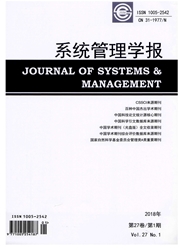

 中文摘要:
中文摘要:
通过选择供需网的一个典型节点,在引入滞销品清仓收益共享这一逆向回流后,基于传统收入共享合同的观点,对非对称信息下两层组装供需系统的协调及效率问题进行了分析。分析表明,引入逆向回流收益共享后,单纯收入共享合同的实施,并不能促成系统的有效协调;进一步,在对存在竞争和信号发送的共享合同中,分别建立系统各主体的报童模型,表明只有同时引入“信号发送”机制和同类配件供应竞争,并在长期合作导向下,才能实现供需系统的有效协调。数值解分析验证了上述结论的合理性;同时,这一结论也符合供需网本意。
 英文摘要:
英文摘要:
The paper analyzes the coordination and efficiency of a two-tiers assembly supply and demand system, in which the reverse logistics exist as a result of the sharing of the salvage value of the left-overinventories. In the presence of the reverse logistics and asymmetric information, our research indicates that the traditional revenue-sharing contract cannot effectively coordinate the supply chain. Furthermore, underthe sharing contract for the system with competition and signaling, our analysis through establishing the newsvendor model separately for every party of the supply chain implies that the effective coordination canonly be achieved through introducing the signaling mechanism and suppliers' competition of the same kind of products simultaneously, plus the incentive for a long-term relationship. Our conclusion is justifiedthrough a computational study, and is consistent with the original meaning of supply and demand network.
 同期刊论文项目
同期刊论文项目
 同项目期刊论文
同项目期刊论文
 期刊信息
期刊信息
